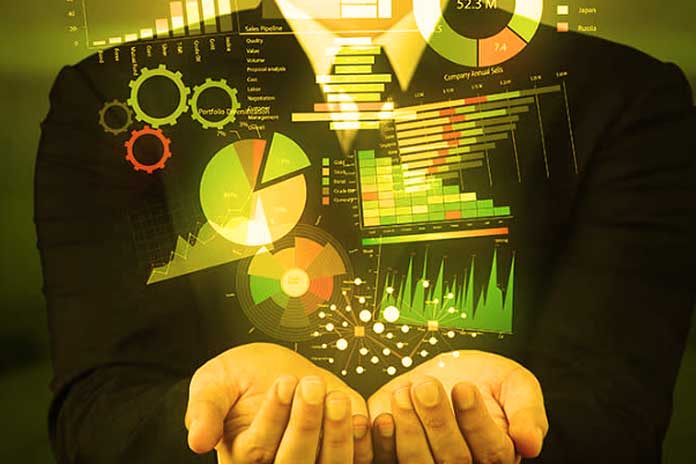By now, it is tough to imagine even a single application context in which a good data visualization does not bring objective advantages for its end users. It’s an infrastructural thing. Thanks to digital applications, data is now fundamental in any process. Let’s see some examples we could cite in data visualization applications in various industrial sectors.
Marketing And Sales
Brands must be able to establish and monitor campaigns faster and faster, having to keep an increasing number of channels under control. Data visualization solutions for marketing allow a unified view of campaign progress through a dashboard where marketers can call up graphics updated in real time with a simple click. These systems automate many routines by combining visual communication’s immediacy with management interfaces’ extreme reconfigurability. This allows you to keep all the necessary metrics under control, saving a lot of time compared to the traditional process.
Supply Chains
Supply chain management constantly uses data visualization tools to speed up the consultation of all information relating to orders and deliveries, making the most of the action of all analytical processes carried out on big data. The data displayed includes both descriptive reports and predictive analyses, helpful in directing and automating decisions as much as possible, for example, on the quantities of short-term goods to be ordered rather than discounting certain types of goods in certain places in specific periods.
Manufacturing
The 4.0 factory is based on the digital twin of the plants and machines active on the production lines. IoT systems can acquire and process data for descriptive and predictive analyses, for example, to support and automate maintenance processes. These systems use data visualization for many applications, ranging from control dashboards to plant status monitors, rather than 3D reconstructions to simulate possible scenarios without jeopardizing the integrity of the plants and preventing machine downtime.
Also Read: Benefits Of Data Science In Business That May Change Your Perspective
Health And Healthcare
Unfortunately, choropleth maps have been very well known since the Covid-19 pandemic, used, for example, by the media to show the viral incidence according to geographical regions, expressed in terms of different colors according to a given numerical value. Data visualization applications in the health sector are widespread, for example, in the field of diagnostic radiology, to disclose aspects that only a pixel-by-pixel analysis can reveal, rather than to reconstruct the structure of microscopic parts in three dimensions like cells, rather than visually simulating surgical reconstructions of various parts of the organism. These procedures facilitate the surgeon’s work, anticipating the complexities of the operating room and reassuring the patient about the probability of success and the qualitative outcome of the operations.
Scientific Visualization
It has always been a privileged field in the application of data visualization. It refers to all contexts in which computer graphics are used to visualize the effects of scientific research processes. There are many examples. In some cases, the visual component has assumed a critical relevance, as in the case of protein folding, in which the three-dimensional reconstruction of protein structures starting from DNA sequences allows a much more efficient approach in molecular biology studies in areas ranging from prevention of some pathologies, up to pharmacological research.
Sports
The automatic tracking systems allow you to analyze the images of sports performance footage in real-time. Combined with artificial intelligence techniques, this technology has enabled many applications based on visualizing sporting event data. From support applications for betting to technical sports performance analysis, predictive analysis helps prevent injuries. An emerging field comprises e-sports, where athletes use artificial intelligence systems and dataviz to analyze and visualize reports and insights from watching matches.
Data visualization technologies in the sports sector now make it possible to use big data both for performance analysis, valid for insiders, and to support modern engagement tools for the public, who can enjoy highly detailed and captivating information from a graphic point of view regarding the events broadcast by the media.
Logistics
Nothing more convenient than having the situation of an entire warehouse under the single glance of a dashboard capable of summarizing all the inventory. In the transport sector, on the other hand, the support of navigation tools is practically indispensable, which use maps and digital graphic functions to describe the best routes—a significant advantage when optimizing the work of thousands of couriers.
Finance
Analyzing financial trends is one of the most popular data visualization applications. This is true when it comes to following the simple performance of security on the stock markets rather than tracing and monitoring the behavior of choice relating to even very complex investment plans, capable of involving hundreds of securities and other variables such as derivatives, currencies, stocks, bonds, rather than the same commodities, or of the same cryptocurrencies, with the blockchain that has opened a new application universe for the dataviz.
Cyber Security
Data visualization is an increasingly requested application in cybersecurity to facilitate the understanding of vast amounts of data coming from scans and analyses of various kinds. The DataViz systems, supported by the real-time analysis of the artificial intelligence systems of the images, allow you to automatically extract graphic reports helpful in detecting anomalies and responding appropriately to attacks and threats from the network.
Politics
A constant of every electoral marathon is the exit polls and projections of seats, expressed through graphs that summarize the percentages of votes obtained by each candidate. This information represents the media and spectacularized part of an enormous work carried out behind the scenes of the entire electoral campaign to update those directly concerned on the continuous trends in the polls.
Education And Didactics
Data visualization tools are used exceptionally frequently to facilitate communication in teaching and educational processes, both in schools and professional training contexts, without forgetting the fundamental contribution to museums and cultural heritage.
Also Read: How Can Data Visualization Boost Your Real Estate Investment Business


